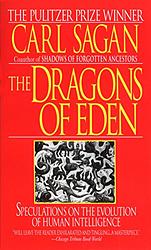The Dragons of Eden by Carl Sagan
This book explores the fascinating topic of the evolution of human intelligence, from the big bang to the present day. The author uses a blend of psychology, anthropology, and biology to propose theories on how the human brain has evolved over time. The book also delves into the role of reptilian and mammalian brains in human evolution, while drawing parallels between the development of the brain and the cosmos. The author's theories are supported by a wide range of scientific evidence, making this a compelling read for anyone interested in the evolution of intelligence.
The 9457th greatest book of all time
Ranking Details:
Our ranking system awards points to books based on their appearance and position on curated lists. Here's how it works:
Unranked Lists: For lists without specific rankings, each book receives points equivalent to the list's weight. This approach recognizes the book's inclusion on prestigious lists.
Ranked Lists: Books on ranked lists receive points in two ways:
- Base Points: Initially, every book is awarded points equal to the list's weight, acknowledging its significance.
- Bonus Points: Additionally, books earn bonus points based on their ranking. The total bonus pool, equal to 100% of the list's weight, is distributed among the books, with higher-ranked books receiving more points.
Exponential Distribution: The distribution of bonus points follows an exponential model. This means the top-ranked book (#1) receives significantly more bonus points than those further down the list (e.g., #100). Our algorithm ensures that higher placements are rewarded more generously, reflecting the achievement of a top rank on any given list.
This scoring system ensures that each book's ranking reflects both its presence on multiple lists and its positions within those lists, providing a comprehensive measure of its acclaim and popularity.
Total Points: 18
Since this book was first published in 1977, there is a penalty of 4.8%. The age adjusted score is 17.14.
This is to prevent newer books from reaching super high on the ranked list of the greatest books of all time. The greatest books should also stand the test of time.
- score: 18 -- Pulitzer Prize for Non-Fiction (Weight: 18)

